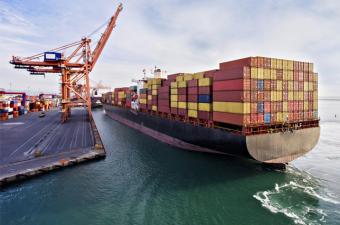
OVERVIEW
In a Judgment handed down on 23 March 2018, Andrew Baker J addressed a number of issues which will be of interest to cargo claimants and their insurers when considering whether and to what extent it is necessary to bring claims both under a charterparty and bills of lading in relation to cargo damage covered by both.
The facts were as follows. The arbitrators had found the respondent shipowners ("Owners") liable under bills of lading for damage to 249,250 boxes of fresh bananas shipped from Guayaquil, Ecuador to Tripoli in Libya in the amount of US$4,567,351.13, this being the difference between the value of the cargo as discharged and its value on arrival in sound condition.
Altfadul, as holders of the bills of lading, had initially sought to reject the cargo under their sale contract with their CIF sellers, Co.Ma.Co. S.p.A. (‘CoMaCo’), who had voyage chartered the carrying vessel directly from Owners.
CoMaCo later allowed a credit of US$2,586,105.09 in subsequent cargo sales to Altfadul, spread over three shipments, with the intention of thereby giving Altfadul the benefit of the cargo insurance payment made by SIAT.The arbitrators held, however, that this credit had been by way of settlement of the dispute under the sale contract and, whilst noting that the amount of the credit was almost exactly the same as the cargo insurance proceeds, they fell short of finding it to be an insurance payment on the evidence before them.
The arbitrators nevertheless held that Altfadul could recover CoMaCo’s loss (ie the loss suffered when CoMaCo gave credit to Altfadul) by virtue of s.2(4) of the Carriage of Goods by Sea Act 1992 ("COGSA 1992").An Award was, therefore, made in the full amount of the loss.
On appeal under section 69 of the Arbitration Act, Owners sought to challenge the finding that Altfadul was entitled to claim the loss suffered by CoMaCo on two grounds:
On the basis that s.2(4) only operates where rights of suit were previously vested in the party suffering the relevant loss but it has lost them by virtue of the operation of s.2(1) of the Act;
On the alternative basis that s.2(4) does not permit the bill of lading holder to claim charterers’ losses under the bill of lading. This argument was based on the decision in The Dunelmia [1970] 1 QB 289, pursuant to which the bill of lading would normally be a mere receipt in the hands of the charterers.
For its part, Altfadul submitted that Owners were wrong on both counts but that in any event the Award should be upheld because Altfadul were entitled to damages equal to the full value of the cargo damage as a matter of English common law, irrespective of any recovery or entitlement to recover from their seller.
In his Judgment, Andrew Baker J dealt first with the last of these issues.Cargo interests relied on the decision of Goddard J (as he then was) in R&W Paul Ltd v National Steamship Co Ltd (1937) 59 Ll L Rep 28 (as supported by other cases and textbooks) to argue that, irrespective of the later payments by CoMaCo, they were nevertheless entitled to recover damages in full and would hold any balance on trust.Owners sought to argue that the principle in that case was circumscribed by The Sanix Ace [1987] 1 Lloyd’s Rep 465, such that, in circumstances where the loss was not directly suffered by the bill of lading holder, he could only recover loss suffered by another if he had owned or was entitled to immediate possession of the cargo at the time it was damaged (an issue which had not been directly dealt with in the Award).
The Judge dismissed Owners’ argument and found that, far from supporting their case, the decision in The Sanix Ace supported cargo interests’ argument.In his view, the decision in R&W Paul was not confined by The Sanix Ace to a case where the claimant was the owner of the cargo (or entitled to possession) when it suffered damage.That issue had been relevant on the facts of The Sanix Ace because the voyage charterer claimed full damages under the voyage charter although (a) it was not the receiver or end purchaser of the cargo and (b) it had been paid in full by the receivers and end purchasers to whom it had sold the cargo. Hobhouse J upheld an award of full damages because even though the charterer in that case did not feel loss by receiving damaged rather than sound goods, it had owned the cargo when it suffered damage and that sufficed.The Judge held that, viewed in this way, the decision in The Sanix Ace extended rather than confined the earlier decision.
The Judge also noted that reading the cases in this way led to what he considered to be a pleasing coherence or symmetry between R&W Paul and The Sanix Ace, whereby (if one assumes title to sue in contract), the carrier is liable for full damages if sued by:
i) the receiver who, by reason of the carrier’s breach, receives damaged rather than sound goods (R&W Paul); or
ii) a claimant who did not receive the damaged goods but who owned the goods when they were damaged by the carrier’s breach (The Sanix Ace).
As he observed, recovery can be made in each case irrespective of how financial loss reflecting or resulting from the cargo damage is or comes to be distributed across the sale of goods chain. The former sues as the owner of the damaged goods since, but for the breach, he would have been the owner of undamaged goods; the latter sues as the owner whose sound goods were damaged. In either case, it is the property in the goods that carries the right to recover full damages – the R&W Paul receiver’s property in damaged goods that he should have received undamaged, the Sanix Ace claimant’s property in the undamaged goods when they were damaged.
Having thus resolved the appeal, the Judge nevertheless went on to consider Owners’ arguments under section 2(4) of COGSA.
With regard to Owners’ first argument, namely that in order for section 2(4) to operate at all the rights of suit vested in the bill of lading holder must have been previously vested in the party suffering loss, the Judge found that there was nothing in the statutory language to suggest that s.2(4) was indeed so narrow. As he noted, it would have solved only half the problems it was meant to address.In particular, it would not have addressed cases where the loss had been suffered by a party below the bill of lading holder in the chain of dealings.The Judge further noted that, had that been the intention, it would have been extraordinary for s.2(4) not to have been drafted in such terms, or by reference to s.2(5), which deals expressly with the loss of rights resulting from the operation of s.2(1).
With regard to Owners’ second argument, namely that section 2(4) does not permit the bill of lading holder to claim charterers’ losses under the bill of lading, the Judge agreed with Owners.He held that the question posed by s.2(4) is to what extent the rights of suit vested by s.2(1) in the bill of lading holder could have been exercised by the party which had suffered the loss, if those rights had been vested by s.2(1) in them.Based on the authority of The Dunelmia, he concluded that the answer was “not at all”.In other words, because the bills of lading would usually constitute a receipt in charterers’ hands, they would not be entitled to recover anything under the bill of lading contracts.
Permission to appeal was refused.
Robert acted for the cargo interests, instructed by Richard Mabane and Alessio Sbraga at HFW.

